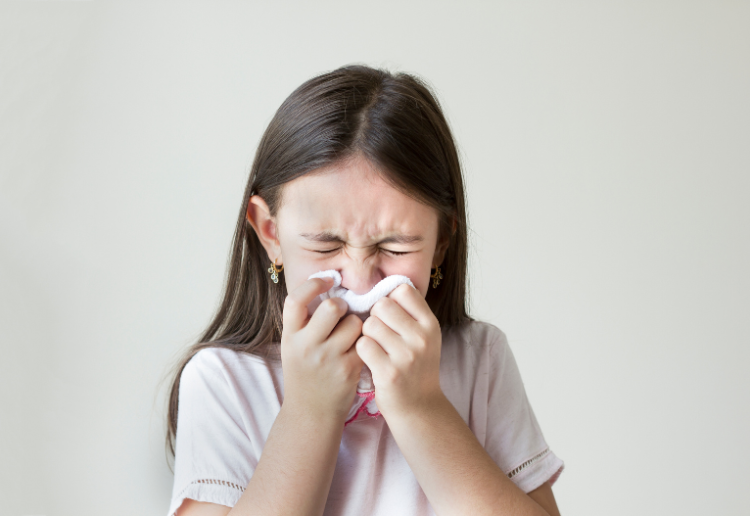As a GP and mum to two boys I have many experiences of trying to navigate the school morning when my boys aren’t feeling well. It always seems to happen on the busiest days.
None of us want to send our child to school when they are not well – I hate the thought of my kids feeling sick in the classroom and also the idea they might make other children sick.
Lots of families have someone for whom illnesses are more dangerous. They might have a weakened immune system because they are going through cancer treatment or suffer from another illness.
But it can be hard to tell. A child might be dramatically crying “my tummy HURTS” one minute and racing around with their sibling the next. Or you might wonder if they are angling for some time off in front of the TV.
How can you tell if your child is too sick to go to school?
Symptoms to look out for
In school-aged children here are some symptoms to consider.
Fever: if your child feels hot to touch, or you have a thermometer showing a fever (a temperature above 38 degrees), then they shouldn’t attend school.
This is even if you are giving them regular paracetamol or ibuprofen to keep their temperature down. Your child won’t feel comfortable at school with a fever and they have a high chance of making others unwell.
Vomiting and diarrhoea: children should stay home until it is at least 24 hours since their last vomit or runny poo. This is to reduce the spread of viral gastroenteritis (or stomach flu) and to make sure your child can stay hydrated and well. If your child is vomiting or has diarrhoea, it also is important to keep a close eye on them to make sure they are improving and to seek medical care if they are getting worse.
Runny noses: a runny nose without a fever might be a sign of hayfever, especially if your child has other symptoms like itchy eyes or sneezing. On its own, this is not a reason to stay home.
But a new runny nose with a fever is a reason to stay home. Many infections, including influenza, COVID and even measles can start with a fever and runny nose, although usually it signals a common cold.

The common cold needs rest, fluids and encouraging your child to keep their nose clear with gentle blowing or saline sprays. And a reminder, the annual flu vaccine is an excellent way to protect your family from the serious consequences of the “proper flu”.
Cough: there are many different reasons for a child to cough. This includes infections such as COVID, whooping cough and influenza and non-infectious reasons such as hayfever and reflux. If your child has developed a new cough, and especially if they are also feverish, this is a reason to keep them at home. A cough that doesn’t go away after two weeks should also be checked out by your GP.
Tiredness: mostly on Fridays, my kids are tired after a busy week – much like me! Tiredness can be an early sign of a lurking infection or some other health issue. But on its own is probably not a reason to keep your child home. However, ongoing tiredness is a good reason to have your child checked out by your GP as there are many causes from poor sleep to iron deficiency.
Poor appetite: kids’ appetites can vary so wildly, especially when they move into growing phases. Not wanting to eat breakfast in the morning might be an early gastro infection, a sign of constipation or nervous butterflies for the day ahead. If your child is otherwise OK, with no tummy pain, fever or tiredness, then a lack of appetite for breakfast is not a solid reason to stay home.
Watch out for school refusal
I find it helpful to let my child know if they stay home, they will need to stay in bed with no screens to rest and get well. This tends to separate the “truly feeling unwell” days from the “just hoping to have a rest” days.
But feeling unwell in the morning – particularly in the tummy, tiredness or unexplained headaches – can be an early sign something might not be going smoothly for your child at school or home.
School refusal is a serious problem where a child is completely overwhelmed and unable to attend school. It can come on gradually or suddenly. Talking with your child’s school is a critical first step if you are concerned about school refusal – it should be a conversation that happens promptly and your school should have procedures for helping you to manage it.
Phone a friend
If you’re not sure, consider giving a trusted friends or family member a quick call to talk things over.
You can also contact Healthdirect on 1800 022 222 (or 13 Health if you are in Queensland). This is a national phone service open 24 hours for anyone who has symptoms and needs advice on what to do next.![]()
Liz Sturgiss, Professor of Community Medicine and Clinical Education, Bond University
This article is republished from The Conversation under a Creative Commons license. Read the original article.





















-

-
-
sars_angelchik said
- 29 Aug 2025
-

-
-
tessie said
- 17 Aug 2025
-

-
-
mom486197 said
- 13 Aug 2025
-

-
-
mom265671 said
- 11 Aug 2025
-

-
-
TraceyGail said
- 06 Jun 2025
-

-
-
mom486197 said
- 29 Apr 2025
-

-
-
ChiWren said
- 28 Apr 2025
-

-
-
mom101628 said
- 21 Apr 2025
-

-
-
mom160270 said
- 08 Apr 2025
-

-
-
mom486197 said
- 07 Apr 2025
-

-
-
tessie said
- 02 Apr 2025
-

-
-
meedee said
- 02 Apr 2025
-

-
-
BellaB said
- 01 Apr 2025
-

-
-
mom93821 said
- 01 Apr 2025
-

-
-
sars_angelchik said
- 01 Apr 2025
-

-
-
DanMum said
- 01 Apr 2025
-

-
-
mom265671 said
- 31 Mar 2025
-

-
-
BellaB said
- 31 Mar 2025
-

-
-
mom489452 said
- 31 Mar 2025
-

-
-
cassy26 said
- 31 Mar 2025
Post a comment2:17 pm
1:52 pm
12:25 pm
8:43 pm
10:00 am
9:32 am
9:32 pm
4:14 pm
12:56 pm
10:28 am
2:14 pm
11:41 am
6:36 pm
9:55 am
9:41 am
7:11 am
7:24 pm
6:22 pm
1:53 pm
1:46 pm
To post a review/comment please join us or login so we can allocate your points.